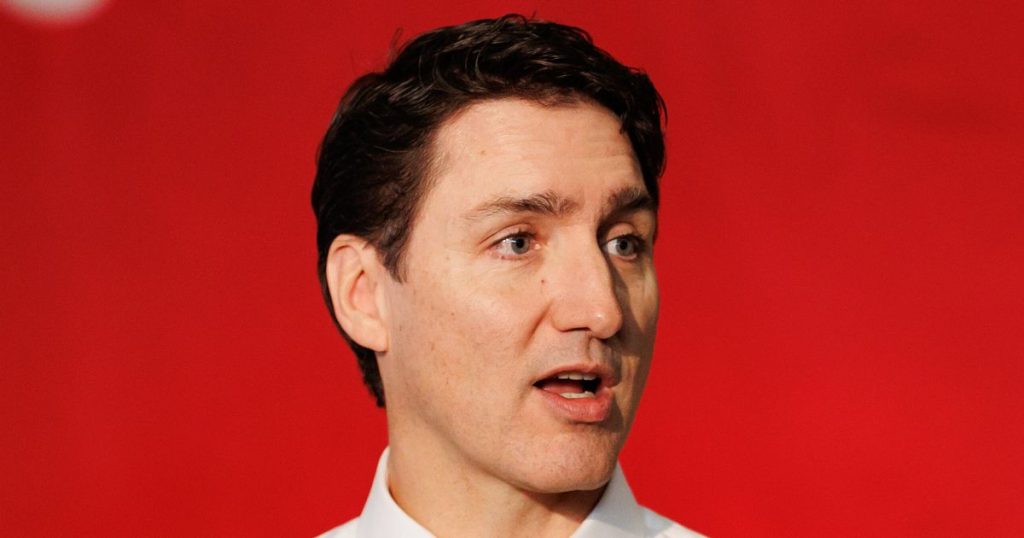In a recent and unexpected turn of events, Canadian Prime Minister Justin Trudeau found himself at the center of a diplomatic stir after his unguarded remarks about former U.S. President Donald Trump’s ambitions toward Canada were caught on a hot microphone. During a private meeting with business and labor leaders, Trudeau candidly shared his thoughts on Trump’s provocative proposal to make Canada the 51st U.S. state. Trudeau’s comments, which were inadvertently recorded and later reported by CNN’s Paula Newton, shed light on the tensions and complexities of the Canada-U.S. relationship under Trump’s presidency. The prime minister’s remarks underscored the delicate balance Canada must strike in its dealings with its powerful southern neighbor.
Trudeau’s comments were made during a moment when he believed the media had left the room, allowing him to speak frankly about the challenges Canada faces in its interactions with the United States. He noted that Trump and other U.S. officials are acutely aware of Canada’s vast resources, particularly its critical minerals, which are essential for advancing technologies like electric vehicles and renewable energy. Trudeau suggested that Trump views the absorption of Canada as a means to gain direct access to these resources without the need for diplomatic or trade negotiations. “Mr. Trump has it in mind that one of the easiest ways of doing that is absorbing our country,” Trudeau said. “And it is a real thing.”
This revelation comes on the heels of a series of contentious exchanges between the two nations under Trump’s leadership. Earlier this year, Trump threatened to impose a 25% tariff on Canadian goods, citing concerns over the smuggling of fentanyl, a deadly synthetic opioid, across the northern border. However, experts and officials have pointed out that the vast majority of fentanyl entering the U.S. originates from other sources, and the amount seized at the Canada-U.S. border is relatively minimal. Despite this, Trump used the issue as a pretext for his tariff proposal, which was met with swift resistance from Canadian officials and their counterparts in Mexico, who also faced similar threats.
In response to the tariffs, Canada and Mexico announced plans to implement counter-tariffs on U.S. goods, setting the stage for a potentially damaging trade war between the three nations. However, Trump later softened his stance, delaying the implementation of tariffs by 30 days after Canada and Mexico agreed to strengthen border enforcement and legal efforts to curb the flow of illegal drugs into the U.S. This volte-face highlights the unpredictable nature of Trump’s foreign policy approach, which often combines hardball negotiating tactics with sudden reversals.
Trudeau’s candid remarks also touch on the broader context of Trump’s long-standing fascination with the idea of making Canada the 51st U.S. state. This notion, while unlikely to become a reality, has been a topic of discussion since late last year, when Trump and Trudeau met at Trump’s Mar-a-Lago estate. According to sources, Trump has consistently expressed admiration for Canada’s natural resources and has entertained the idea of incorporating the country into the United States as a way to consolidate American economic and geopolitical power. Trudeau, however, remains wary of this proposal, viewing it as an attempt to divert attention from more pressing issues, such as Trump’s earlier threats to impose tariffs on Canadian oil, gas, and electricity.
In public remarks following the hot mic incident, Trudeau emphasized the need for Canada to approach these challenges with a clear-eyed and strategic mindset. He acknowledged that U.S. officials, under Trump’s leadership, are likely to push for advantageous economic deals that could leave Canada with limited options. Trudeau’s government is now focusing on tactical and strategic planning to navigate these pressures while safeguarding Canadian interests. The situation underscores the delicate balance of power in the Canada-U.S. relationship and the need for careful diplomacy in the face of an unpredictable neighbor. As Trudeau’s unguarded comments reveal, the stakes are high, and the path ahead will require wisdom, foresight, and a commitment to protecting Canada’s sovereignty and economic well-being.
